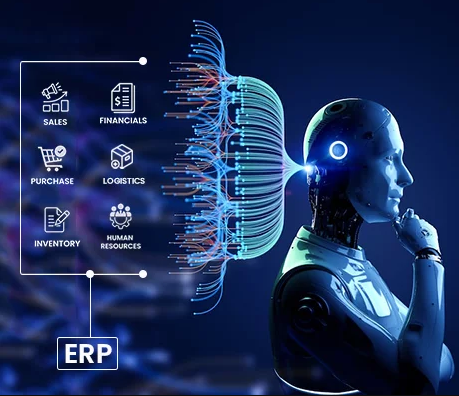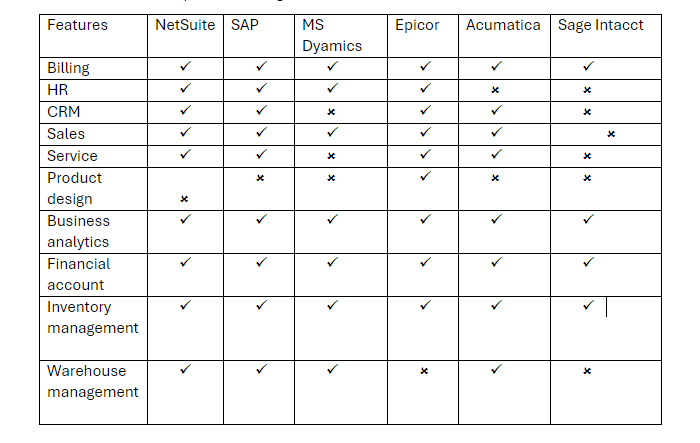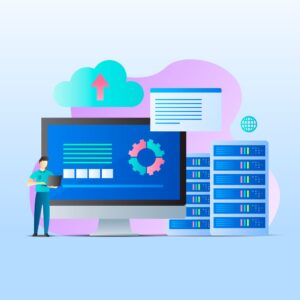According to Thomson’s data, 88% of organizations worldwide leverage at least one type of Enterprise Resource Planning (ERP) tool daily to manage their business operations.
NetSuite has long been a leader in the ERP space. However, there is now a growing array of NetSuite alternatives, offering businesses more choices than ever before. This expanded pool of ERP options provides an opportunity for businesses to find solutions that are better tailored to their specific needs.
But how do these alternatives stack up against the big names in the ERP industry? The competition among ERP solutions has made choosing the right ERP partner a challenging task. Today, determining which ERP solution effectively addresses your business’s unique pain points is a complex process that often requires expert guidance.
If you are exploring which ERP system, including NetSuite, can exponentially grow your business by managing operations, enhancing efficiency, and maximizing productivity, you’ve come to the right place. This blog offers a comprehensive comparison of NetSuite vs other ERPs and helps you determine which one best meets your business needs.
Continue reading to learn more!
ERP A brief introduction
Enterprise Resource Planning (ERP) software is a cloud-based software solution that has become an industry standard for helping organizations plan, automate, and manage daily business operations, including accounting, procurement, warehouse operations, project management, and risk and compliance. Additionally, it enables you to finalize budgets, predict future outcomes, and generate reports based on performance.
NetSuite ERP vs Other ERP solutions
As NetSuite has grown exponentially over the years, alternatives have emerged to contend in the enterprise resource planning space. To determine which software best meets your business needs, you must examine their features, core capabilities, advantages, accessibility, ease of use, design goals, and background. Lets begin!
#1. NetSuite: A ERP solution
The cloud-based NetSuite ERP system is known for its high modularity and its ability to enhance existing ERP solutions. It offers extensive customization options, allowing businesses to streamline their operations and tailor the system to their specific requirements. With a suite of integrated applications, users can efficiently manage finance, order processing, inventory, warehouse operations, CRM, HR, and more from a single platform. NetSuite ERP essentially provides a comprehensive set of core capabilities necessary for achieving business excellence.
Despite offering unparalleled capabilities, ERP systems like NetSuite may not be the most cost-effective option for small companies with limited budgets. Additionally, for individuals new to ERP systems, there is often a significant learning curve associated with mastering the platform.
Why NetSuite ERP?
- Robust security backups
- Complete suite for your business
- Holistic view of insights
- Easy to scale & upgrade
- Tailored solutions
- Seamless process efficiency
- Best for business with complicated process
Drawbacks
- Basic support is limited.
- Subscription pricing models differ among plans.
#2. SAP
SAP (Systems, Applications & Products in Data Processing) is renowned for its robust features and exceptional capabilities. From powerful modules to seamless operations across various sectors including finance, logistics, human resources, and procurement, the SAP ERP system caters to large-scale business requirements.
As a cloud-based ERP system, SAP offers a potent global support network, industry-specific solutions, and extensive customizations. Additionally, it provides flexible deployment options, allowing you to implement it either on-premises or in the cloud.
Why choose SAP ERP System?
- Provides a holistic data view for seamless communication
- Enables workflow automation both in the cloud and on-premises
- Versatile and easily accessible from any location
- Offers training courses and certifications for skill enhancement
Drawbacks of SAP:
- Complicated to implement and maintain
- More complex, costlier, and time-consuming
- Requires training to manage the platform
- Not suitable for small or mid-sized businesses

#3. Microsoft Dynamics
As a cloud-based business solution, Microsoft provides enterprise resource planning and customer relationship management systems by acquiring them. In 2006, Microsoft introduced the widely used platform, Microsoft Dynamics 365, which is tailored to serve enterprises in financial management, project management, human resources, supply chain management, and CRM.
Organizations that have fully integrated into the Microsoft ecosystem are maximizing the benefits of Microsoft Dynamics 365 ERP. This includes the ability to integrate a variety of applications, such as Office 365 and Power Platform, to enhance their operations and efficiency.
Why Microsoft Dynamics ERP features?
- Flexible to opt for cloud-based & on-premises
- Easy integration with Microsoft products
- User-friendly experience
- Less appropriate for enterprises
- Plans are very expensive
- Additional cost for upgrades
#4. Epicor
Epicor provides a specialized enterprise resource planning system designed for the manufacturing and distribution sectors. The Epicor ERP System offers a modular approach and can be implemented using a cloud-based or on-premises SaaS (Software-as-a-Service) model. Like other ERPs, you can unlock basic functionalities with Epicor ERP system.
Why Choose Epicor ERP:
- Highly flexible and customizable
- Automates money-management tasks
- Versatile and simple-to-use interface
- Interface varies with modules
- Complicated deployment
- Requires expertise for implementation
- Free trials are not available
#5. Acumatica
Acumatica stands out in the crowded ERP landscape due to its exceptional scalability and flexibility, catering to a wide range of small to medium-sized organizations across various industries such as finance, manufacturing, distribution, and project management. Its open architecture, seamless customization, and third-party integration capabilities further enhance its appeal.
Why choose Acumatica’s software?
- Modular extraction and expansion capabilities
- Open architecture facilitates integration and customization
- Swift report generation
- User-friendly management and customization
Drawbacks:
- Less intuitive user interface
- Lack of industry-specific features
- High cost, particularly prohibitive for small businesses
#6. Sage Intacct
The Sage Intacct software is a comprehensive platform designed for managing financial processes and operations. It covers various aspects such as invoicing, purchase invoices, cash flow, inventory, supply chain, warehouse management, and bank reconciliation. Its real-time management capabilities through dashboards and reports make it a powerful and flexible choice for seamless integration across industries. In essence, Sage Intacct is the ideal solution for those seeking efficient accounting capabilities, seamless integration, and robust finance management.
Why choose Sage intacct ERP System?
- Ideal for organizations with complicated accounting and financial needs
- Multi-entity and multi-dimensional accounting capabilities
- Simple and easy implementation process
- A holistic view of company insights through reports
Drawbacks:
- Steep learning curve like NetSuite ERP
- Lack of an intuitive interface
- Automation set up is complicated
NetSuite Vs Other ERPs Features
ERP software like NetSuite varies in features, design, processes, and direction. Let’s understand the comparison through this table

Final thoughts
When choosing an enterprise resource planning system for your business, it’s crucial to consider various factors, including company size, requirements, goals, scalability needs, user interface, and budget. While there are several robust ERP solutions available, NetSuite ERP stands out as a superior choice for businesses prioritizing accessibility, usability, and flexibility. Its comprehensive suite of integrated applications, extensive customization options, and real-time analytics make it an unparalleled solution for achieving business excellence. However, it may not be the right fit for every business, highlighting the importance of consulting with ERP implementation experts.
Although other ERP solutions such as SAP, Microsoft Dynamics 365, Epicor, Acumatica, and Sage Intacct have their own advantages, they often fall short in terms of ease of use, integration capabilities, and cost-effectiveness for complex business needs compared to NetSuite. By leveraging NetSuite ERP, businesses can ensure seamless process efficiency, tailored solutions, and robust support for their growth and operational excellence.
For businesses looking to implement or optimize their ERP system, consulting with experts like Entartes is essential. With over 15 years of experience in providing NetSuite ERP and consulting services, Entartes can significantly enhance your business productivity and ensure you leverage the full potential of your ERP investment
Ready to boost your sales games?



